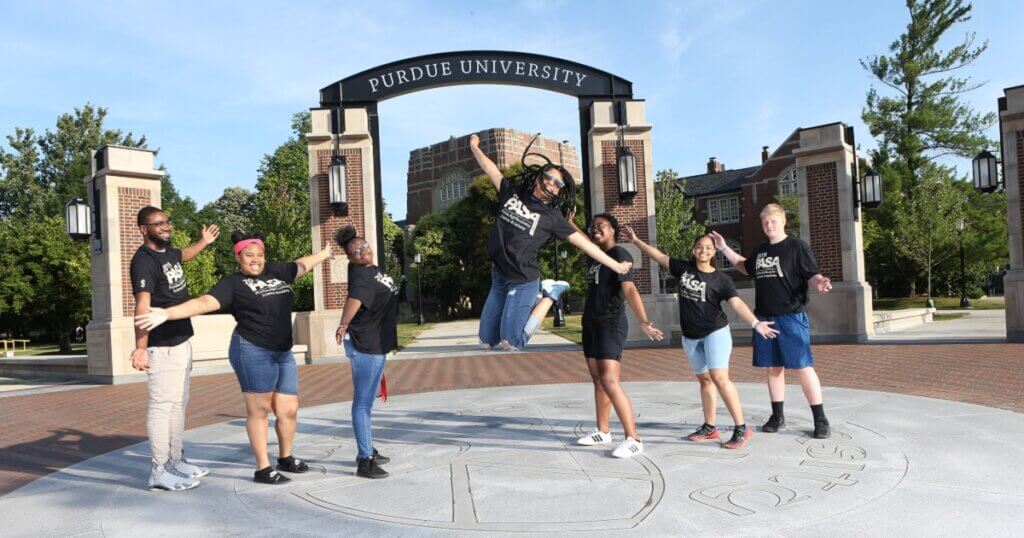Cargill Partnership seeks to bridge diversity and gender gaps in agriculture
After 14 years as an annual summer camp for high school students interested in learning more about agriculture, the Purdue Agribusiness Science Academy (PASA) has found a partner to help create even more opportunities for underrepresented minorities agriculture.
James Monger, a diversity, equity and inclusion champion for Cargill, said the global food corporation was looking to work with more organizations to address social equity and offer underserved populations better access and awareness to career paths in agriculture. To accomplish these goals, Cargill provided Purdue with a $400k gift to make the summer camp free for attendees and to create the Cargill Partnership Program Coordinator position for the next two years. The PASA program has now been renamed Cargill-PASA.
 2019 Purdue Agribusiness Science Academy (PASA) students
2019 Purdue Agribusiness Science Academy (PASA) students “It costs about $450 per student to attend these camps, and this grant will eliminate this fee so students who would not have been able to previously can attend this camp,” Monger said.
Pamala Morris, associate dean in the College of Agriculture and director of the Office of Multicultural Programs, said the history OMP has with Monger, as well as Cargill, can be traced a few years back.
At the 2010 MANRRS conference in Orlando, Florida, Morris said she ran into Monger in a hotel hallway where he told her that Cargill was looking for opportunities to engage with MANRRS at Purdue.
“At the end of each academic year, we have a dinner that was previously a pitch-in to celebrate our graduating students, honor our outgoing officers and welcome our incoming officers. I wanted to make this more of a formal event for our students, so I told him this was something Cargill could sponsor,” Morris said. “He told me, ‘You’ve got a deal.’ So, when I got back to West Lafayette, I wasted no time in sending him an email arranging it. Thanks to Cargill and our partnership with James, we have been able to celebrate and look forward to a formal affair each year.
“I think this is a great partnership, because we’re helping each other,” Morris said. “Students may see signs throughout the state with Cargill’s name on it, but they aren’t familiar with what they do in the ag industry. This new partnership exposes students to Cargill and further develops a diverse pipeline of students that will benefit Cargill and the ag industry.”
C-PASA will focus on curriculum and understanding how STEM relates to agriculture, Monger said, creating learning opportunities in collegiate settings to shows students a career in ag is within their reach.
“Getting these kids onto campus to see what this environment is about is key,” he said. “This also allows students to get a sense of what it is like to participate in these group settings away from home. It opens your eyes to what life at college will really be like.”
Part of the target audience for the C-PASA program is urban, inner-city students, Monger said, who tend to be more unaware of the opportunities awaiting them in the field of agriculture.
“What we have discovered is at the professional level, we are really struggling to attract more minorities into the field, and a lot has to do with historical stereotypes,” Monger said. “We are working hard to change the image and thought around working in ag.
“Agriculture is processing, marketing and shipping. It’s adding new value to products,” he said. “And it’s because of those things there are so many more opportunities outside of purely being a farmer.”
Morris said creating those hands-on experiences for students becomes crucial in helping them visualize a future career. Field trips to various facilities, as well as the Indiana Statehouse, are a few opportunities C-PASA students are able to look forward to each year.
“Thanks to the partnership with Cargill, we’ll be able to offer further opportunities for C-PASA students, as well as our science teachers' program and our middle school program,” Morris said. “This can be truly life changing if you’ve never been exposed to some of these experiences.”
Through the partnership with Purdue, Monger said one of Cargill’s biggest goals is to challenge other industry organizations to step forward and work arm in arm to counter the inclusion disproportions.
“The industry as a whole has a gender and minority parity issue, and a university I knew Purdue would do a great job being part of the solution.” Monger said. “Cargill wanted to get this off the ground with Purdue to begin moving forward in the right direction, but we are very open to having other industry leaders come join us. This would really cement agriculture as a future for minorities and women.”






